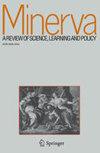“没有令人痛苦的初步准备”的杀戮:科学家为英国生物战计划辩护。
IF 3.2
2区 哲学
Q1 EDUCATION & EDUCATIONAL RESEARCH
引用次数: 12
摘要
本文介绍了英国科学家(主要是科学顾问)试图为生物武器研究辩护的历史案例。虽然历史记录很少,但他们的理由有一定程度的连续性,并且可以确定一些主题。有人认为,生物武器研究在道德上是合理的,因为它生产的是人道武器;这与医学或其他研究没有什么不同;这是出于防御目的。有人认为,这种辩护主要是针对其他从事细菌战研究的科学家的,并且是这个秘密团体的“道德经济”的一部分。本文章由计算机程序翻译,如有差异,请以英文原文为准。
Killing 'without the distressing preliminaries': Scientists' defence of the British biological warfare programme.
This article presents historical cases in which British scientists, principally scientific advisors, have attempted to defend research on biological weapons. Although the historical record is scant, there is a degree of continuity in their justifications, and a number of themes can be identified. It was argued, that biological weapons research is morally justified because it produces humane weapons; that it is no different from medical or other research; and that is being performed for defensive purposes. It is argued that this defence is directed primarily towards other scientists working on germ warfare, and was formed part of the 'moral economy' of that secret community.
求助全文
通过发布文献求助,成功后即可免费获取论文全文。
去求助
来源期刊

Minerva
Multiple-
CiteScore
5.20
自引率
4.30%
发文量
26
期刊介绍:
Minerva is devoted to the study of ideas, traditions, cultures and institutions in science, higher education and research. It is concerned no less with history than with present practice, and with the local as well as the global. It speaks to the scholar, the teacher, the policy-maker and the administrator. It features articles, essay reviews and ''special'' issues on themes of topical importance. It represents no single school of thought, but welcomes diversity, within the rules of rational discourse. Its contributions are peer-reviewed. Its audience is world-wide.
 求助内容:
求助内容: 应助结果提醒方式:
应助结果提醒方式:


